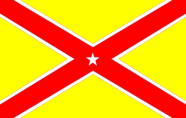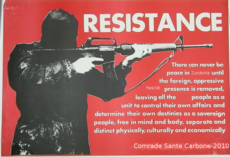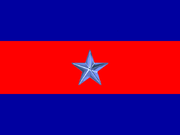History of Kozuc
- Many pages regarding "Kozuc" redirect here - see Transitional Authority of Kozuc for more information.
The history of Kozuc, with the most recent carnation being the Transitional Authority of Kozuc, is split into six eras, starting from the United Provinces Under Chance, and resulting with its current status as an independent micronation located in California. Riley Small, as the leading politician throughout its history, has both been the nation's head of state and as the head of government. Currently, Kozuc is focused on reestablishing itself as a influential force in the community.
Kozuc, the Transitional Authority and its many other forms of government, is a micronation that has had a long history in the community, plagued with both war and instability. Throughout its time some have considered Kozuc as a leader. From its beginnings as a project by middle school students who fabricated many of their claims, to becoming a fully functional secessionist cultural movement, Kozuc has found itself both a part of conflicts and as a mediator within the community.
Fictional Era

The United Provinces Under Chance was the longest independent non-Kozuc micronation to be founded in the Monterey area. The United Provinces existed from February 1, 2010 to September 12 of that same year. The UPUC reported having a large population due to the government counting all of the families of registered citizens and any residents of claimed territory as a part of the nation. This lead to large amounts of doubt in the community, especially in regards to claims from the UPUC government about their level of internal activity.
At the time, the UPUC was notorious for sockpuppeting, as it claimed that three other micronations, known as "Scandel", "Sovia" and "Lowsia", existed in the area around them. Scandel, of course based around the name Skendal, an actual micronation that had gone inactive years prior. The UPUC would soon find itself facing international pressures to collapse. These were lead by allegations from the leadership of the former Yabloko and A1. As the nation developed, its reputation in the community became worse, and would soon fail for lack of factual information.
During all of this, government reforms were taking place. Despite the disorganized political system, out of these reforms came a constitution that would hold true until its dissolution. Essentially having the same government form, and lead by the same regime, the UPUC collapsed into the Kingdom of Zurdonia, naming Chance Anderson as King and Riley Small as its head of government.
Zurdonia and Atlantis

The Zurdon and Atlantis period began after the fall of the United Provinces Under Chance when Riley Small named Chance Anderson the King of Zurdonia. This period was the beginning of a type of micronationalism in the area that would lead to the "Kozuc" nations. The Kingdom quickly jumped into the Atlantis Civil War, most notably in the Pacific Front, entering only one day after foundation. Zurdonia was short lived and disbanded on the 25th of October, when the "Tyler Revolutionary Forces" declared victory over the Kingdom.
The Atlantis period then began, and "Kozuc" was formed. Kozuc, first an acronym for "Kingdom of Zurdonia Under Chance", was made up of new citizens from Small's school, and with the leave of Chance Anderson from politics, major reforms took place. Kozuc first became a part of the Republic of Atlantis as a Confederated State. Riley Small, who was both a deputy in the Atlantis Parliament and Minister of Home Affairs, took control over the Atlantis Intelligence Service and worked in the nation until the first of December 2010. Many Kozuc people joined the Atlantis government as agents in the intelligence service, governors of Kozuc regions and in local offices. This was the beginning to the transition into actual factual micronationalism, which began in the Kingdom of Zurdonia. During this time, Small was a leading figure in the WMA and held many offices within it.
First Republic
Kozuc left Atlantis after a large conflict with St.Charlie, marking the first independent republic. This period began with Small writing an extensive, 156 article constitution and Liam Barnard becoming active in politics. Although movement towards factual micronationalism were made during this time, many claims were still exaggerated. At this point, Kozuc was still a part of the WMA and held close ties with the Republic of Atlantis. The first signs of socialism came about during these times, with the People's Republic of Kozuc. Soon though, this would come to a complete stop. This period soon ended with the dissolution of the first People's Republic.
The nature of Kozuc's claims were still questionable during this time. Small was still regarded by the community as a "sockpuppeter", although the micronation had already began to transition into the realm of factual secessionalism. With the dissolution of the first People's Republic, Small would begin to rebuild his relationships with the micronational community in the "Era of Revival".
Era of Revival
Riley Small re-entered the community with apologies during for the lies and fabrications during prior eras, now commonly known as the "Era of Revival". The community accepted him back in and he would soon work his way back up to being a respected micronationalist. Soon, he would found the Kozuc Khanate, a micronation consisting of delegates from other micronations with himself as Khan and all citizens as members of the Parliament. The Khanate was purely online.
I learned much about the community during my times before the Era of Revival; it was more of myself testing the waters within the community. The water was very hot but I jumped in anyway without seeking guidance, and got burned. Since then, I have healed my wounds and become an active political force in the community. St.Charlie has helped me do this, and I thank them for that.
The Khanate was a great and active political force in the community for about 2 months, until many of its members became inactive. Riley Small and his new partner Joseph Puglisi, made their last attempt to save this nation, allowing for any members to have dual citizenship, and reforming it into a Kingdom, but this was essentially the same as the Khanate. The Kingdom lasted only about two weeks until it was formally disestablished by the Small in May of 2011
Small's first St.Charlian career

After the dissolution of the Khanate, Small decided he would seek citizenship in the Federal Republic of St.Charlie. On May 22, 2011, Riley Small became the Oversees Ambassador and a member of the Ambassadorial Council of the Federal Republic. This would lead to Riley Small's increase in influence, and he would soon become their delegate to the former Organisation of Active Micronations (OAM). As the first bisexual member of the Council, he played a pivotal role in reforming many past allegations that the body was "homophobic" and the stigmas that went with their point of view.
During this time, the Republic of Skendal, which would soon become known by many as "West Kozuc", would be founded and Riley Small would try to get the St.Charlian ban on dual citizenship repealed in order to participate in local micronationalism. Also, during this time, Small became known for being the "Man who killed Istoria" after he had St.Charlie and many other micronations embargo the micronation over homophobic laws they had in place. Small also would play one of the largest roles in ending the New Guinea scandal by arguing on the side of Alexander Reinhardt to remove them from the OAM. Small would leave St.Charlie in August 2011 to refound his own micronation, but he stated that he will continue to keep close ties with the Federal Republic.
Two Kozuc Era
The Two Kozuc Era, also known as the "Golden Age", was the beginning of the fully factual and functioning Kozuc, and its rise as a powerful force in the community. This Era would begin with two major events; the founding of Skendal, or" West Kozuc" and Riley Small entering high school and gaining interested and active citizens. West Kozuc and East Kozuc would be founded as a capitalist west and a socialist east. Soon, however, the West would also become a communist state. During this time, Riley Small became a prominent figure in the intermicronational community, especially on Skype and the forums. Small would play a part in Yablokogate. Kozuc-Sandum diplomatic issues arose over the banning of Walruses in the Kozuc region and "professionalism". The ISDO, a special group of East Kozuc military personnel, were commissioned by the government to plan and execute "Operation J-Dub". This marked the forceful takeover of West Kozuc, merging them into a single Empire.
Skendal Liberation Movement
During the end of the Golden Age, the Skendal Prefecture declared independence from Kozuc. The Kozuc government reacted in a way that would allow them to peacefully leave under certain territorial agreements. Skendal, however, decided that they would claim over half of Kozuc controlled territory, the entirety of the Bourland National Park (now known as Bourland), as their own. This sparked some controversy in the community and the "Liberate West Kozuc Association" was founded by Westsylvania and some other members of the community. Soon, on Christmas Eve, a deal was decided on and the land was split equally between the two nations based on their prior occupied territory and how they would use the land. Three party talks, between Skendal, Kozuc and Tiana, led to this decision along with international pressure from supporters on both sides.
St.Charlian Era
After Kozuc split, Kozuc entered the Federal Republic of St.Charlie as a Federation. After Small's change of schools, Kozuc's activity dwindled. Small became the Minister of Home Affairs for Kozuc, and was a delegate for the Federal Republic at the PoliNation conference in London. During this time, there was unrest within the federation regarding its status as a Federation. When Small took the Presidency, and was their representative to the St.Charlian General Assembly, many in the region dissented.
Kozuc officially joined as a Federation on the 14th of April, 2012. On December 19 of that same year, Kozuc left the federal republic to form an independent micronation, and the fourth Kozuc republic.
Renasian Era: Dissolution

During the Renasian Era, independent Kozuc did not sustain itself for long. Soon, after reformation, the republic joined the now defunct Free State of Renasia as a Special Administrative Region. Kozucs activity fluctuated, with most of its politics moving more internal between its members. Kozuc's agriculture business was the main focus of the society at the time, and it was recognized intermicronationally for its lenient policies on marijuana and drug use. This period led to the slow demise of Kozuc in 2014.
Riley Small, president of the Republic and representative to the Renasian government, was sentenced to a lockdown facility for charges undisclosed in Texas. Attempts to keep internal activity continued, but the lack of communication with the community led to many thinking it had dissolved. The official dissolution of the government took place in January 2015, on approval from President Small and then acting President Rutger Sperry, although inactivity had plagued the region for quite some time prior.
Era of Rebirth
Riley Small decided, after leaving his lockdown, he would reenter the micronational community. First, after consulting with local officials in the former Kozuc Republic, he decided to form a new Kozuc state. This period has been known as the "Era of Rebirth". On June 21, the Republic was refounded, with the constitution being ratified just six days later. Socialists from former "West Kozuc" and nationals from "East Kozuc" both joined this new state, with the only other micronation in the area being the Empire of Frexico. For months the multi-party system would stay in place, until the Nationalist Revolution.
Nationalist Revolution
After the constitution was enacted, and elections held, a deadlock began between the two parties, with the Socialist-majority in the legislature and the National Party controlling the Presidency. When quorum could no longer be met, Small claimed the government had become inactive. Nationals blame the socialists for not willing to compromise after their loss in the referendum on which form of government would be used, and Socialists said it was because the Opposition had two incarcerated MPs. After calling for the resignation of these members from the left, the President continued to stand by them.
Finally, among many controversies and disputes regarding the facts leading to this, Small ordered the military to install him as dictator and place a military junta in command of the nation, the Revolutionary Council. Since then, internal conflicts between the parties have begun, but the President strongly holds his ground. However, negotiations between many different factions including the military, Socialists, Nationals and the President's government began in the first part of January 2016. The Revolutionary Council has agreed to only hold power until a new constitution is approved by the people.